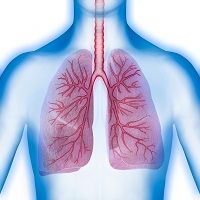Multidisciplinary Discharge Programs Improve Outcomes of Acute Exacerbations of COPD
A COPD care bundle delivered by a multidisciplinary health care team can reduce hospital readmission rates for acute exacerbations of COPD (AECOPD).

FDA-BW.jpgAs the third most common cause of readmission among Medicare beneficiaries, chronic obstructive pulmonary disease (COPD) manifests in about 60% of patients within 1 year of hospital discharge and in 30% within 3 months of discharge.
Since decreasing readmissions in COPD patients decreases healthcare utilization of resources and improves patient health, investigators decided to investigate if a type of COPD care bundle delivered by a multidisciplinary health care team would reduce hospital readmission rates for acute exacerbations of COPD (AECOPD).
The prospective cohort design study presented at the 2018 CHEST Annual Meeting in San Antonio, TX, that included pre and post intervention arms. Individuals admitted at Morristown Medical Center (MMC) with AECOPD from April to September of 2016 were enrolled in the pre-intervention group.
Following enrollment, an evidence-based COPD care bundle was created, which included 3 primary objectives—patient education on COPD by healthcare providers prior to discharge; completion of an individualized self-management COPD action plan to be used by patients after hospital discharge; and timely outpatient follow-up with a pulmonologist.
Subsequent to the implementation of the COPD care bundle in April of 2017, patients were enrolled in the post-intervention group if they were admitted with AECOPD at MMC from April to September of 2017.
Data regarding patient characteristics, hospital length of stay (LOS), discharge location, and readmission rates for both groups were recorded.
Via the Pearson chi-square test or Fisher exact test for categorical variables and 2-sample t-test or Mann Whitney test for continuous variables, statistical analyses were performed.
Thirty-day readmission rates served as the primary outcome, while hospital LOS served as the secondary outcome.
In the pre-intervention group, 150 patients were enrolled while in the post-intervention group, 221 patients were enrolled. In terms of clinically relevant patient characteristics, the 2 groups were similar.
Compared to those in the post-intervention group, 30-day readmission rate was lower (22.2% versus 32.7%, p=0.024) as were 60-day and 90-day readmission rates in the post-intervention group, (30.3% versus 56.0% (p< 0.001) and 35.3% versus 62.6% (p<0.001), respectively). The duration of hospital stay was also similar in the 2 groups at 8 days versus 7 days (p=0.322).
Based on the data, study authors concluded that hospital readmission rates in AECOPD patients were significantly reduced with implementation of a discharge care bundle. Additionally, the hospital length of stay was not increased, and the reduction in readmissions continued through 60 and 90 days.
Study authors noted the clinical implication of a multidisciplinary discharge program. Since it can be easily integrated and improve patient outcomes in those admitted with AECOPD, they suggested this type of program should be considered in all hospitals.
The multidisciplinary discharge program only echoes another study that investigated a comprehensive care plan for patients with AECOPD. In the plan that included a diagnosis, treatment of specific co-morbidities, and improved transitions in care (between the hospital and home), investigators found that both readmission and mortality rates were reduced.
“Close attention to the details of good medical practice leads to a reduction in readmissions, mortality, and costs,” study author Jill Ohar, MD, told MD Magazine®. “My experience tells me that programs such as ours are extremely labor intensive and take a huge effort to sustain, however, we don’t yet have data to support this.”
Click here to sign up for more MD Magazine content and updates.Related Coverage >>>How Type 2 Cytokines Burden Severe Asthma
Triple Therapy Improves COPD Exacerbations Regardless of Reversibility Status
Montelukast/Levocetirizine Combination Therapy Yields Effective in Phase 3 Trial
The abstract, "A Discharge Care Bundle Reduces Readmissions in Patients with Acute Exacerbation of Chronic Obstructive Pulmonary Disease” was presented at the CHEST 2018 annual meeting.